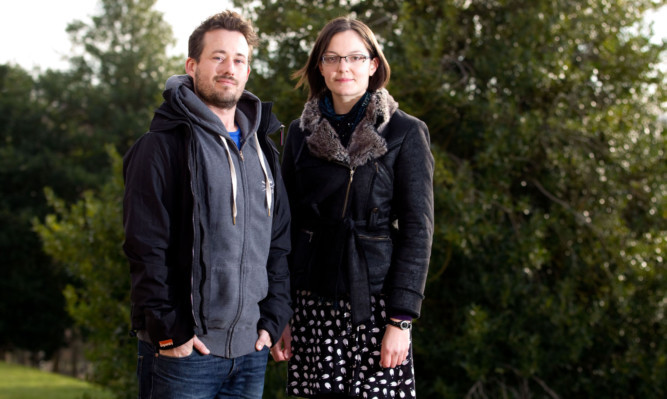
A young scientist who worked in a vital Ebola lab in Sierra Leone was inspired by the Dustin Hoffman film Outbreak.
Steve Welch, 34, processed highly contagious samples of the world’s most deadly virus working in a super-secure lab.
Trussed up in protective gear and working in stifling 34C temperatures, the young researcher toiled over samples of the killer contagion, his work proving vital in the fight to save victims.
The Glasgow Uni PhD science graduate was hand-picked along with fellow researcher Gillian Slack by scientists at the Government’s top secret Porton Down lab in Salisbury, Wiltshire.
But his journey down the path towards the gruelling posting started as a teenager, after he became a fan of the 1995 Dustin Hoffman thriller, Outbreak.
It tells how scientists are forced into a race against time to battle a killer virus a plot eerily reminiscent of the current West African epidemic which has claimed more than 9,000 lives.
Steve reveake: “I was inspired to work with dangerous viruses after seeing Outbreak. I was 15 and it became a motivating factor to get the grades to study science at university.
“I wanted to be a doctor but also desperately wanted to research viruses.
“Working with Ebola was too good an opportunity to miss and has been the highlight of my career so far. Helping to save lives is hugely rewarding.
“Half of those who contract Ebola die and we had to treat it with huge respect, obeying strict protocols at all times.
“But any time I got a sore throat or felt warm I would wonder if I had picked up the disease but I guess that is a perfectly natural response.”
Fellow team member Gillian, 30, from Bishopbriggs, East Dunbartonshire, was previously part of the microbiology team at Ninewells Hospital in Dundee.
Steve had worked previously for nine years at Porton Down, which was set up in 1916 at the height of the First World War as a top secret chemical weapons centre.
Both spent five weeks as vital volunteers in the diagnostic labs run by Save The Children in Kerry Town, Sierra Leone.
Training for the dangerous task involved a five-day workshop at Porton Down where they were schooled in the strict rules of working in highly protective masks, gowns and gauntlet gloves.
Gillian said the intensive training “was a world away from my previous job at Ninewells”.
She added: “But I knew if I stayed strictly to the rules I would avoid contamination. We had to constantly remind ourselves not to touch our faces which we all do instinctively several times daily.”
Once out there they examined 80 to 100 samples a day from suspected victims.
Final-year PhD student Gillian, who worked for the same charity which flew Ebola virus victim Pauline Cafferkey out to West Africa, said working eight-hour shifts over a six-day week in the lab took its toll.
She said: “Patients’ samples were dropped off and immediately submerged in buckets of heavily bleached water.
“This made sure that the outside of the samples were completely clean and safe to bring into the lab.
“Besides adhering to strict protocols, we were never allowed to have any hands-on human contact with anyone else during our time in Kerry Town. Not a reassuring hug, handshake or even pat on the back in case one picked it up and passed it on.
“We worked in temperatures so high our theatre gowns would literally change colour and darken with the sweat. The smell of bleach from the buckets we used became quite reassuring and not in the least sickening.
“I was driven by the need to help others and any feelings of exhaustion were overcome by doing something life-saving and so worthwhile.
“When I returned home to my family in Glasgow my parents were so pleased to see me safe they hugged me.
“That felt odd having human contact after none for several weeks. It takes a while to shift to a relaxed mode after living with the strict rules surrounding Ebola.”
It is Gillian’s ambition to work in the world-leading infectious diseases CDC lab in Atlanta, USA.
Steve has already secured a top research job there.
“Helping people by diagnosing viruses is hugely rewarding as they can then get treatment as soon as possible,” Gillian said. “That gives them their best chance to survive.”
She previously faced the challenge of working on deadly bugs in helping to diagnose victims in a deadly anthrax outbreak in Edinburgh.
Both Steve, from Penzance, Cornwall, and Gillian say their families accepted their work with Ebola.
“They understood that I work with viruses and know the risks well enough to protect myself,“ Steve said.
The Glasgow scientists stayed in the same hotel in Kerry Town as Pauline Cafferkey but missed her by a few days when both stayed there last November.
“When we heard that a nurse had contracted Ebola we all wondered who it was and we then learned she was one of the Scottish nurses who had gone out to work directly with patients,” Steve added.
We told last month how stricken nurse Pauline Cafferkey, 39, recovered from the disease and has now been freed from hospital.
She credited her recovery, in part, to downing copious amounts of Irn Bru.

Enjoy the convenience of having The Sunday Post delivered as a digital ePaper straight to your smartphone, tablet or computer.
Subscribe for only £5.49 a month and enjoy all the benefits of the printed paper as a digital replica.
Subscribe